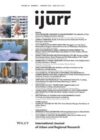This article examines how in Douala, Cameroon, the state regulates urban development despite the city’s low level of planning. The analysis is based on an ethnographic study of municipal bureaucracies to understand how a form of social regulation of construction emerges. Social regulation is explored through sociolegal practices that take shape in the daily interactions between municipal officials and urban dwellers during authorization and control processes for construction. Three practices are analysed: (a) initiating a building permit application; (b) relying on a third-party protector or financial arrangement; and (c) resorting to the ‘building permit default’. Using Douala as a case study, this article seeks to deepen understanding of urban governance in African contexts by examining the diversity and entanglement of norms and regulatory logics. It offers a detailed analysis of how state agents implement official procedures, enforce legal frameworks and produce administrative formalities, moving beyond the formal/informal divide.
Details
Written by:
LUDOVIC BAKEBEK
Digital Object Identifier (DOI)
https://doi.org/10.1111/1468-2427.13367
About DOI
